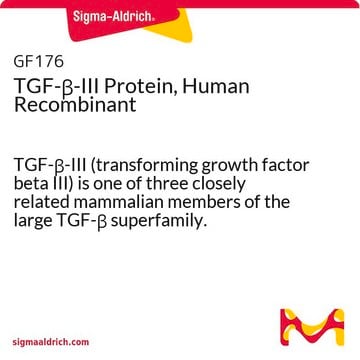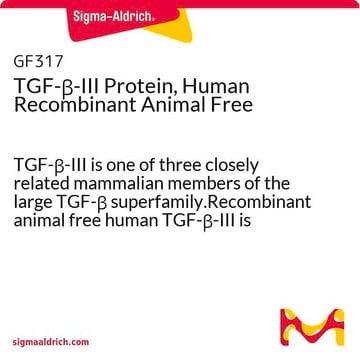SRP6552
TGF-β3 from mouse
recombinant, expressed in E. coli, ≥98% (SDS-PAGE)
Synonym(s):
Transforming growth factor beta-3
Sign Into View Organizational & Contract Pricing
All Photos(1)
About This Item
UNSPSC Code:
12352202
NACRES:
NA.32
Recommended Products
biological source
mouse
recombinant
expressed in E. coli
Assay
≥98% (SDS-PAGE)
form
liquid
mol wt
25.5 kDa
packaging
pkg of 5 μg
pkg of 50 μg
pkg of 500 μg
concentration
0.25 mg/mL
impurities
≤1 EU/μg endotoxin (LAL test)
UniProt accession no.
shipped in
dry ice
storage temp.
−70°C
Gene Information
mouse ... TGF-beta-1(21803)
General description
TGFβ3 (transforming growth factor β3) is one of the three isoforms of mammalian TGFβ, and all the isoforms share high sequence similarity at the active domains, with TGFβ3 showing highest similarity with TGFβ1.
Recombinant mouse TGF-β3 is a non-glycosylated, disulfide-linked homodimer, containing two 112 amino acid chains, with a total molecular weight of 25.5kDa.
Recombinant mouse TGF-β3 is a non-glycosylated, disulfide-linked homodimer, containing two 112 amino acid chains, with a total molecular weight of 25.5kDa.
The TGFB1 gene is mapped to human chromosome 19q13.2. The encoded protein is an anti-inflammatory cytokine.
Biochem/physiol Actions
TGFβ3 (transforming growth factor β3) shows higher expression levels during late stage tumors, and hence, is thought to be associated with tumorigenesis. However, studies also show that in skin, breast, oral and gastric mucosa and other types of tissue, this protein confers protection against tumorigenesis. It plays crucial role in the development of systems such as heart, breast and lung. It is essential for mouse embryonic palate fusion, as inactivation results in non-fusion of palatal shelves. This protein plays a crucial role in orofacial development and is essential for excisional wound repair in vivo.
Physical form
0.25 mg/mL solution containing 20% ethanol and 0.12% acetic acid (AcOH) .
Flash Point(F)
does not flash
Flash Point(C)
does not flash
Certificates of Analysis (COA)
Search for Certificates of Analysis (COA) by entering the products Lot/Batch Number. Lot and Batch Numbers can be found on a product’s label following the words ‘Lot’ or ‘Batch’.
Already Own This Product?
Find documentation for the products that you have recently purchased in the Document Library.
Transforming growth factor Beta 3 is required for excisional wound repair in vivo.
Le M et al
PLoS ONE, 7(10), e48040-e48040 (2012)
Peripheral regulatory T cells and anti-inflammatory cytokines in children with juvenile idiopathic arthritis
Sznurkowska K, et al.
Acta Biochimica Polonica, 65(1), 1908-1916 (2018)
TGF-beta3 and cancer: a review.
Laverty HG et al
Cytokine & Growth Factor Reviews, 20(4), 305-317 (2009)
Identification of PAK4 as a putative target gene for amplification within 19q13.12-q13.2 in oral squamous-cell carcinoma
Begum A, et al.
Cancer Science, 100(10), 1908-1916 (2009)
Zhaoyang Liu et al.
eLife, 10 (2021-07-29)
Adolescent idiopathic scoliosis (AIS) is the most common spine disorder affecting children worldwide, yet little is known about the pathogenesis of this disorder. Here, we demonstrate that genetic regulation of structural components of the axial skeleton, the intervertebral discs, and
Our team of scientists has experience in all areas of research including Life Science, Material Science, Chemical Synthesis, Chromatography, Analytical and many others.
Contact Technical Service





